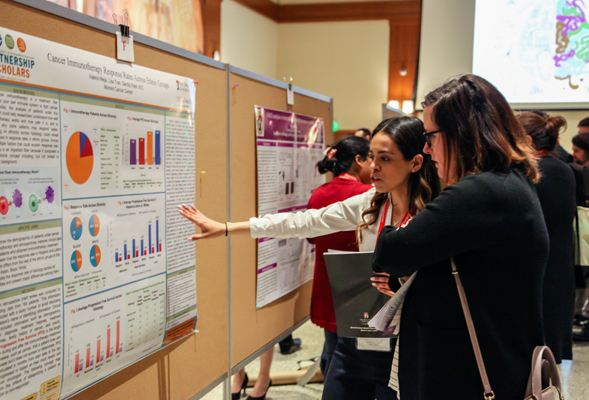Faculty Gearing Up for 12th Annual Student Research Symposium
Their mentorship helped push registration above 500 in last two years.

With San Diego State University President Adela de la Torre driving major institutional initiatives in support of student, faculty and staff development, and with ambitious plans for future growth, SDSU opens 2019 with increased momentum toward an expanded community impact.
"Directions: SDSU in 2019" is a series highlighting top stories related to university research, student success and innovative programs and provides a forward-looking lens into the work of students, faculty and staff.
They are the “frequent flyers” of research at San Diego State University—those faculty members whose students have taken part in the SDSU Student Research Symposium (SRS) multiple years since it debuted in 2008.
Linda Gallo, professor of psychology, is among this group of 100-plus mentors. With their guidance, SRS participation has grown to include upwards of 500 student presenters. This year’s 12th annual SRS is scheduled for March 1-2 in the Conrad Prebys Aztec Student Union. Registration closes Monday, Jan. 28.
Gallo’s research focuses on social-cultural factors in health, and developing and testing culturally appropriate interventions to reduce disparities in diabetes, cardiovascular disease and related conditions in Hispanics/Latinos.
Here she explains how the SRS is valuable for both students and their faculty mentors.
Q. Why have you encouraged your students to register for the SRS?
A. Mentoring students in the research process is a favorite aspect of my career as a professor. It is especially rewarding when undergraduate students enter the lab with the idea that they “have to” obtain research experience so they can compete for graduate school, only to leave a year or two later with plans to seek a scientifically-focused career. We have so many bright and talented students at SDSU, and working with them one-on-one or in a small group context allows their creativity and motivation to truly shine.
Q. What are the benefits of participation for students?
A. The SRS provides an excellent opportunity for students to showcase their work and get to know other students and faculty conducting research at the university. The experience is valuable in the graduate application process, and it can set the stage for presentations at larger local and national conferences. I also find that the students enjoy working together on their abstracts and presentations. The more senior students appreciate the opportunity to mentor newer students.
Q. Describe a student presentation that was particularly successful.
A. A first-generation college student I mentored, Annalia Valdivia, presented her research on "Weight Cycling and its Psychological Effect on Mexican American women." The study found that women of Mexican descent who reported frequent weight gains and losses were more likely to report higher levels of depression, anxiety, anger and chronic life stress. She presented the study in a talk that was very well received, and she was subsequently honored with a Compact Scholar Research Award for her contribution. Everyone in the lab was impressed by her creativity, dedication, and enthusiasm. The excitement she drew from the SRS experience was infectious.
Q. What are the advantages/disadvantages of poster versus oral presentations?
A. I feel that both forms of presentation offer advantages. The oral presentation affords students the opportunity to practice their public speaking skills while learning how to distill a complex project into a succinct, meaningful talk. In the poster presentation format, students have more time to discuss their work with SRS attendees and to answer questions, and they often get to know other students presenting work nearby.



